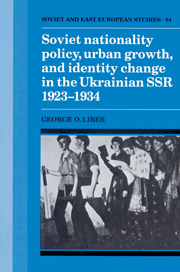Book contents
- Frontmatter
- Contents
- List of tables
- Acknowledgments
- Abbreviations
- A note on transliteration
- Maps
- Introduction
- Part I Periphery and center
- 1 The Ukrainian environment, 1861–1921
- 2 The Bolshevik response
- Part II Social changes
- Part III Political consequences
- Part IV Center's reaction
- Conclusion
- Appendices
- Notes
- Bibliography
- Index
- Soviet and East European Studies
2 - The Bolshevik response
Published online by Cambridge University Press: 03 February 2010
- Frontmatter
- Contents
- List of tables
- Acknowledgments
- Abbreviations
- A note on transliteration
- Maps
- Introduction
- Part I Periphery and center
- 1 The Ukrainian environment, 1861–1921
- 2 The Bolshevik response
- Part II Social changes
- Part III Political consequences
- Part IV Center's reaction
- Conclusion
- Appendices
- Notes
- Bibliography
- Index
- Soviet and East European Studies
Summary
Violent peasant and non-Russian resistance to Soviet power forced the Bolsheviks to recognize and to deal with the major social disparities within the largest country in the world. Although the tsarist political order collapsed in the spring of 1917, the social, economic and cultural legacy of the old order remained. Beginning in the sixteenth century, Russia annexed territories containing a wide variety of national and religious groups which were not fully developed political entities with a matching political consciousness. Located on the periphery of the empire, these territories differed not only from the center, but also from each other.
Of the 140 million people in Soviet Russia and its allied republics in 1921, 75 million were Russians and 65 million were non-Russians. Of the latter, nearly 30 million were Ukrainians and 30 million were of Turkic background. The population density varied from 2.4 people per square kilometer in Kirghizia to 53.0 in the Ukrainian republic, which possessed the most densely populated urban and rural populations of all the non-Russian regions.
Although these areas possessed rich natural resources, they remained economically underdeveloped. A small number of non-Russian regions did not diverge from Russia in industrial development; the majority, however, did. Capitalism barely penetrated most of these areas. As a result, the non-Russians did not possess a native bourgeoisie or their own proletariat. The indigenous populations consisted mainly of peasants or nomads. Those in Turkestan lived a “half-patriarchal, half-feudal life style.”
Culturally, the non-Russians varied widely. Some national groups (such as the Poles, Finns, Latvians, and Ukrainians) possessed their own fully developed languages, cultures, and literatures.
- Type
- Chapter
- Information
- Soviet Nationality Policy, Urban Growth, and Identity Change in the Ukrainian SSR 1923–1934 , pp. 26 - 46Publisher: Cambridge University PressPrint publication year: 1992
- 1
- Cited by



